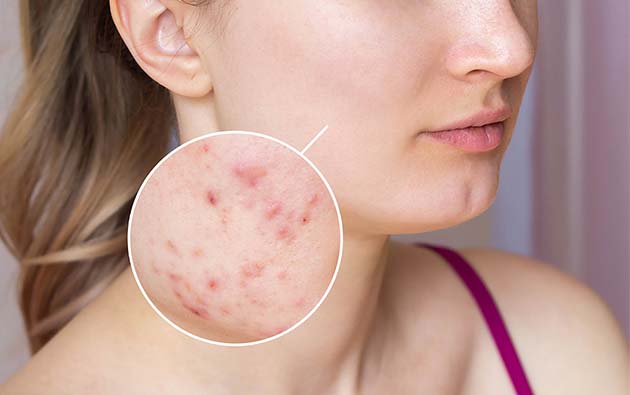
PCOS is a hormonal disorder that can create too much androgen in the body, increasing inflammation in the skin. In this blog we talk about how the hormone plays a role in causing cystic acne and how one can manage them
Polycystic ovarian syndrome (PCOS) is one of the most common hormone disorders women face. PCOS is a serious condition that requires medical treatment as it affects one’s fertility and metabolism.
According to the World Health Organization (WHO), an estimate of over 116 million women (3.4%) are affected by PCOS worldwide.
It affects a woman’s bodily functions and shows up in a variety of symptoms like excess hair growth (hirsutism), pattern hair loss and/or bald patches (alopecia), obesity, menstrual irregularities, infertility and acne.
Although it is a stressful condition for women to deal with acne, it can severely impact the way a person sees themselves. The most common areas where PCOS-induced acne may appear are on the jaw, upper back, upper arms, chest, and butt
Acne caused by PCOS can be slightly different from acne vulgaris, which affects about 80% of adolescents and may fade away over time. However, before talking about ways to overcome PCOS-related acne, let’s understand what causes it.
The key distinction for acne vulgaris and cystic acne is that cystic acne may occur due to an oversensitivity to androgen, despite its levels being normal in the affected population.
Even for women dealing with PCOS, only about 20-40 percent of them may get acne. However, as cystic acne can be a huge task to deal with, various medical treatments are available to help women deal with it. If you wish to know more about cystic as well as the different types of acne vulgaris.
Doctors recommend medical treatments like hormonal birth control, topical treatments like benzoyl peroxide or retinol, antibiotics, isotretinoin pills, spironolactone (androgens-blocking medication). However, these are all prescription medicines that one should never take without a dermatologist’s advice, and while proper treatment is required to battle all aspects of PCOS, there are two major areas women can look into to control the severity of cystic acne caused by PCOS.
Things like diet changes and an effective skin care routine can help a lot. It is recommended that women with PCOS follow an anti-inflammatory diet consisting of foods rich in fibre like lentils, chickpeas, leafy vegetables, and avoid/reduce the consumption of items like bread, rice, pasta, cookies, meat, and fast foods.
As for skincare habits, it is important to cleanse one’s face with an anti-acne face wash like AcneStar, keep the skin hydrated by moisturising it daily and protect it from irritants and pollutants that may increase the bacteria buildup on skin. This facewash combines the best of both worlds with the goodness of ingredients like aloe vera, basil, calendula chamomile, salicylic acid, and glycolic acid.
PCOS can often go undiagnosed and later on cause severe health issues, making it all the more important to be on the lookout for its signs and symptoms to be able to treat it effectively. All said and done, at the end of the day, just like other types of acne, PCOS-related acne too takes patience and time to go away.
Disclaimer This blog solely intended for the educational/informational/awareness purposes and is not a substitute for any professional medical advice, diagnosis or treatment. Please consult your doctor/healthcare professional before acting on the information provided on the blog. Reliance on any or all information provided in the blog, is solely at your own risk and responsibility. Mankind Pharma Limited shall not be held liable, in any circumstance whatsoever.

Acne is a skin condition that occurs when your hair follicles become plugged with oil and dead skin cells.

it is absolutely imperative to know its type. Acne can be inflammatory or non-inflammatory which further has different lesions, as mentioned below.

Acne starts occurring in teenagers due to an increase in the level of Androgen production. Androgen is a hormone which signals the body to produce more sebum, the oil produced by the sebaceous glands.

Acne is a skin condition that occurs when your hair follicles become plugged with oil and dead skin cells. It often causes whiteheads, blackheads or pimples, and usually appears on the face, forehead, chest, upper back and shoulders. Acne is most common among teenagers, though it affects people of all ages.

Debunk acne myths by following a proper skincare regimen. Taking good care of your skin can help you achieve a glowing and acne-free skin.